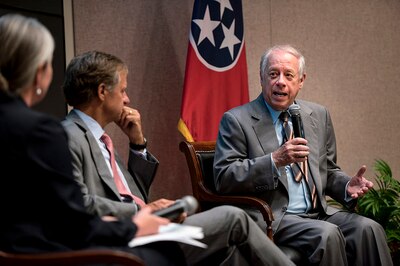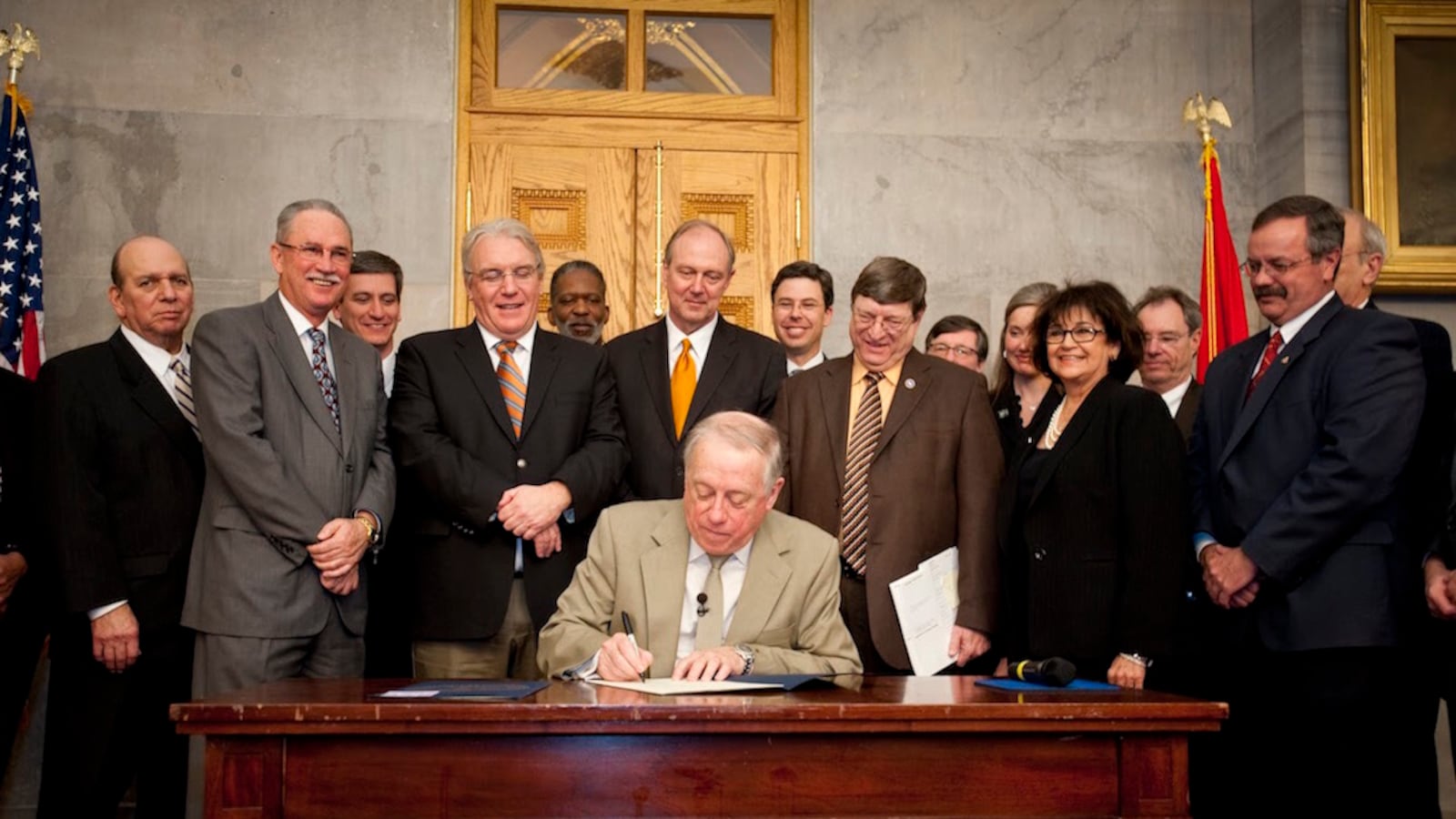As a key adviser to former Gov. Phil Bredesen, Will Pinkston was an insider in Tennessee’s aggressive campaign to overhaul public education policies and win a $500 million award under the federal Race to the Top competition in 2010.
Later as a school board member in Nashville, he had a front-row seat to how those changes played out and the money was used.

Now approaching the 10th anniversary of the signing of a federal stimulus package that funded Race to the Top grants, Pinkston is apologizing to students, parents, and teachers for his role in spawning what he calls “some of the most damaging education policies in modern American history.”
In a 16,000-word essay that he self-published on Monday, Pinkston depicts Tennessee’s Race to the Top journey as a well-intentioned bipartisan effort to improve schools that disintegrated into a full-board assault on public education by punishing teachers and their unions.
Pinkston’s essay is titled “Race to the Bottom: How Bad Actors Tried to Destroy Public Education.”
It’s one perspective — but one that’s likely to interest education observers in Tennessee and beyond. Here’s part of his introduction:
I see in retrospect the mistake that I made while working on Race to the Top. I feel equal parts guilty and sad about it. In my view, the problem isn’t that Race to the Top’s fundamentals were flawed. No one can argue with the need for rigorous K-12 academic standards and aligned tests, effective school turnaround strategies and a focus on great teachers and school leaders. But Race to the Top jumped the rails when a cast of radical reformers hijacked the agenda during political transitions. Bad actors began working overtime to dismantle public schools. Here in Tennessee, our largest school systems — in Memphis and Nashville — became part of ground zero in the country’s civil war over public education, joining embattled school systems in cities like Los Angeles, Milwaukee and New Orleans.
A communications and political consultant who last year worked on Bredesen’s unsuccessful U.S. Senate bid, Pinkston writes harshly about the administration of former Gov. Bill Haslam, a moderate Republican who in 2011 succeeded Pinkston’s Democratic term-limited boss, and the newly elected GOP-controlled legislature with which Haslam worked. Pinkston charges that they used the handoff on Race to the Top as a license to hurt the state teachers union and enact policies that undermine traditional public schools. Here’s another excerpt:
In April [of 2011], Haslam signed into law a bill making it harder for teachers to obtain and retain tenure. In June, he signed into law the repeal of teachers’ collective bargaining rights. That same month, he signed into law a bill doing away with caps and eligibility limits on publicly financed, privately run charter schools, which many people oppose because they drain resources from existing public schools. The new charter law also converted the [state-run] Achievement School District, created by the First to the Top Act to turn around persistently failing schools, into a statewide authorizer of charter schools. Changes in the ASD would have a negative fiscal impact on the state’s largest school systems in Memphis and Nashville, and rile parent-teacher organizations.
In just six months on the job, Haslam managed to alienate Tennessee’s teaching profession — or at least the state’s largest teachers’ union, the 52,000-member Tennessee Education Association. Along the way, he broke the grand bargain that had been struck during Race to the Top — that all the key players were in it together and would collaborate as a team.
Within two years, however, Tennessee was basking in the glow of outsized gains on the Nation’s Report Card. Pinkston offers his own explanation for the state’s rise in national academic rankings: New academic standards were part of the Race to the Top vision but had reached Tennessee classrooms months before state lawmakers approved the full reform package.
On November 7, 2013, the Haslam administration got a public reprieve of sorts. The U.S. Department of Education announced that Tennessee had become the fastest-improving state in the history the National Assessment of Educational Progress (NAEP), also known as the Nation’s Report Card. The results were impressive. Tennessee’s 4th-graders climbed from 46th to 37th in math, and 41st to 31st in reading. In terms of overall student growth,“we literally blew away the other states,” Haslam said during a celebratory news conference at West Wilson Middle School in Mt. Juliet, Tenn., outside of Nashville. The governor failed to acknowledge that Tennessee’s Race to the Top plan, which he initially refused to endorse, actually predicted steep gains on the Nation’s Report Card following implementation of more rigorous academic standards in the 2009-10 school year. The 2010 Race to the Top plan expressly noted: “On the NAEP, we know from experience that results are harder to shift, and that we will not likely see real gains until 2013 when students have had several years under the new standards.” Someone had a crystal ball.
Pinkston has been a polarizing personality since his election to Nashville’s school board in 2012, particularly because of his contempt for the charter movement and his zeal for preserving funding for traditional public schools. A former board member of a Nashville charter school, Pinkston said the experience left him disenchanted with the publicly funded, privately governed schools, and he began working aggressively to prevent the charter sector from expanding in the city where he graduated from public schools. He since has gotten into occasional combative exchanges with both charter supporters and leaders on social media. Pinkston describes his public persona this way:
Not long after I was elected, my former boss Gov. Bredesen suggested to a reporter that my biggest challenge on the school board might be managing my own temperament because I don’t “suffer fools gladly.” He was right. And in my estimation, the landscape was swarming with fools.
Fools who didn’t understand basic math when it came to the negative fiscal impact of unabated charter growth. Fools who didn’t comprehend that Tennessee only became the fastest-improving state in the history of the Nation’s Report Card by pursuing nearly a decade of systemic reforms and investments — not ripping apart the fabric of urban school systems. Fools who didn’t value what I considered to be our greatest democratic institution — public education.
A former journalist with The (Nashville) Tennessean and The Wall Street Journal, Pinkston said he wrote the essay over the course of four years to chronicle the history of Tennessee’s Race to the Top journey and to provide an insider’s perspective on the state’s education policy changes over the last decade.
“We’re talking about a multibillion-dollar federal program — and Tennessee was at the leading edge, or as it turned out, the bleeding edge,” he said.
The essay was published on a personal website, and Pinkston told Chalkbeat that he developed the project at his own expense.

In the last year, Haslam has racked up national awards and attention for his education work in office — particularly the launch of several pioneering college scholarship programs that offer two years of tuition-free education to high school graduates and adults. But Pinkston said he’s “annoyed at how badly the Haslam administration and the legislature screwed up” with Tennessee’s Race to the Top.
“A lot of good people worked very hard, for years, to build a bipartisan collaborative reform framework that got trashed in a matter of months and, a decade later, will take years to sort out in the courts,” he said, referencing a lawsuit scheduled for trial this year over the adequacy of state funding for schools.
Haslam did not immediately respond on Monday when asked for comment about Pinkston’s essay. (As outgoing governor, he reflected on his education legacy during this 2018 Q&A with Chalkbeat.)
Pinkston’s term on Nashville’s school board ends in 2020.

